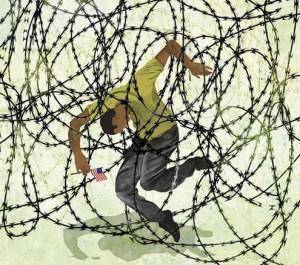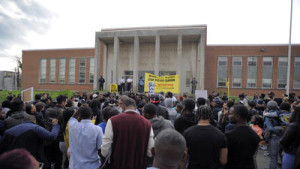Thousands in St. Louis land in ‘debtor prisons’ for not paying a court fee
Dallas Newspaper Reports From ‘Chaos’ Of Backlogged Immigration Court
 The Dallas Morning News has an important new report on the U.S. Immigration Court backlog, highlighting the case of a Korean man who “… has been in America long enough to raise two sons and run a family-owned doughnut shop in Irving. After years of worrying, he thinks he’s about to find out his fate. Things look promising. But [the judge] sets a merit hearing for Dec. 6, 2017.”
The Dallas Morning News has an important new report on the U.S. Immigration Court backlog, highlighting the case of a Korean man who “… has been in America long enough to raise two sons and run a family-owned doughnut shop in Irving. After years of worrying, he thinks he’s about to find out his fate. Things look promising. But [the judge] sets a merit hearing for Dec. 6, 2017.”
Reporter Dianne Solis makes the point that the man is “… caught in an immigration court system that is bursting with huge caseloads and stressed by a seemingly endless shortage of judges. The U.S. immigration court backlog is at a record 474,000 cases — nearly triple the number from a decade ago. The average case now takes two years to wind through the courts. Some can take five.”
One interesting think is that the report notes that the Immigration Court backlog “annoys both the political left and right. U.S. Rep. Jack Ratcliffe, R-Heath, called it a ‘de facto amnesty’ at a recent congressional hearing. Immigrants live in the U.S. for years waiting to find out whether they can, well, live in the U.S.”
But, the report continues, “… Democrats complain that the courts need more money to operate smoothly. The nation’s immigration courts have long functioned like an orphaned child of the immigration system. The courts’ budget equals about 2 percent of total federal funding for immigration law enforcement this fiscal year. Underfunding the courts ‘undermines justice,’ U.S. Rep. Sheila Jackson Lee, D-Houston, said at the same hearing.”
The DMN also backgrounds that Immigration Court is civil, so there’s no guarantee of an attorney as their would be in criminal court. That’s important because, Solis notes, “… an unrepresented immigrant has a greater chance of losing, of being ordered removed from the U.S. That came into harsh light recently with the surge of Central American mothers with children. In a study by the Transactional Records Access Clearinghouse, a Syracuse University nonprofit, of such cases, about a quarter of those who were represented by attorneys were allowed to stay in the U.S. Only 1.5 percent of those who didn’t have attorneys were allowed to stay.”
The story is basically an indictment of the whole Immigration Court process with the only good point being a promise of more judges soon if certain things work out.
Read it here: Chaos, backlogs straining immigration courts
Houston Press Outlines How Broken Immigration Courts Really Are

Illustration by Brian Stauffer used in a report by The Houston Press, “Immigration Backlog Bounces Thousands of Cases to Late 2019,” 2/10/16
Justice Scalia Was Leader In Civil Justice Decisions

Photo Credit: The U.S. Supreme Court is seen on Saturday in Washington, DC, following the announcement of the death of Supreme Court Justice Antonin Scalia.
NPR report, 2/15/16
The political and criminal-law fallout from the sudden death of U.S. Supreme Court Justice Antonin Scalia is, of course, being widely discussed as President Obama prepares to nominate a successor. But NPR has done a good job at detailing a half-dozen cases that really illustrate how much Justice Scalia sculpted the modern civil litigation landscape.
For example, remember the huge Wal-Mart lawsuit over treatment of female workers? NPR backgrounded the case: “The issue before the Supreme Court was whether female employees as a group could be certified as a single class, suing Wal-Mart at a single trial. Lawyers for the women introduced evidence showing that female employees held two-thirds of the lowest-level hourly jobs at Wal-Mart, but only one-third of the management jobs, and that women overall were paid on average $1.16 per hour less than men in the same jobs, though the women had more seniority and higher performance ratings.”
Scalia was widely noted as a reason Wal-Mart prevailed in its appeal to the high court. Other cases of illustration, like Hobby Lobby and Citizen’s United, can be found here: 6 Major Supreme Court Cases That Would Have Been Different Without Scalia
Justice Dept. Suing Ferguson Over Failure To Make Changes
PROGRAMMING NOTE
Courts Monitor Publisher Sara Warner has written about a dangerous type of natural gas pipe that’s found in millions of American homes. It’s the focus of proposed changes in Lubbock, Texas where the mother of a man killed in a fire blamed on the pipe addressed the city council. It’s at The Huffington Post here: Victim’s Mom Questions Delay on Lubbock CSST Gas Line Reform.
Colorado Water Court Eyes ‘Right’ To Grow Marijuana
A water court case in Colorado’s high country could create new policy that impacts the fast-growing marijuana industry in the Mile High state, the Aspen Daily News is reporting in conjunction with the Aspen Journalism non-profit journalism site. The report explains that a local marijuana cultivator, which works with a local dispensary, applied in 2014 for water rights for between 2,000 to 3,000 pot plants in a 25,000 square foot facility.
Reporter Brent Gardner-Smith continued that “… in response to the High Valley Farms application, a water court referee, who initially reviews applications, asked High Valley to answer the question of whether a water right to grow marijuana in Colorado can be “lawfully” granted when the plant is illegal under federal law. Other marijuana-growing operations in Colorado have gotten their water by using existing water rights, not by applying for new rights specifically to grow pot, as High Valley Farms has done. For example, a grower might have bought land that came with water rights, or may have leased water from a district or city with existing water rights.”
The report added that, “… whether the High Valley Farms case implodes the pot industry or not, the case is on track to set legal precedent.” Pro-marijuana advocates worry that the water court could consider growing to be “unlawful” under federal law, raising doubts about the recent state constitutional amendment legalizing pot not just for medical use but recreationally as well. One of the issues is whether cultivating pot is “beneficial” use under state law.
See the report via the Aspen Daily News here: http://www.aspendailynews.com/section/home/169976

